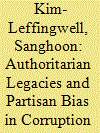| Srl | Item |
| 1 |
ID:
191965


|
|
|
|
|
| Summary/Abstract |
What explains the lack of electoral consequences for corrupt politicians? Building on studies of motivated reasoning and asymmetric partisan bias, this article highlights the importance of partisan differences in how voters interpret corruption convictions and make voting decisions. I contend that in post-authoritarian democracies, supporters of authoritarian legacy parties (ALPs) are less likely to punish corrupt copartisan incumbents compared to supporters of other parties faced with equally corrupt copartisan incumbents. While voters of all kinds appear likely to ignore corruption among copartisan incumbents, supporters of authoritarian legacy parties are particularly likely to do so. Using original datasets from South Korea, this study shows empirical evidence of the lack of corruption voting for ALP partisans across three legislative elections. This article further finds partisan discrepancies and a striking lack of corruption voting among authoritarian legacy partisans.
|
|
|
|
|
|
|
|
|
|
|
|
|
|
|
|
| 2 |
ID:
164806


|
|
|
|
|
| Summary/Abstract |
In the past few decades, post-democratization politics in South Korea have witnessed an upsurge in authoritarian nostalgia, called the “Park Jung-hee syndrome.” This paper examines the origins of public nostalgia for the authoritarian dictator by putting two theoretical arguments, i.e., the socialization thesis and the system output thesis, to an empirical test. This paper utilizes the 2010 Korea Democracy Barometer from the Korea Barometer and the 2010 and the 2015 Korean National Identity Survey from the East Asia Institute. The empirical analysis of the South Korean case strongly supports the political socialization argument, suggesting that citizens’ yearning for Park Jung-hee is not merely an outcome of the negative evaluations of the democratic governments’ performances. Rather, their authoritarian nostalgia is in large part an outcome of their political socialization during the Park dictatorship. The analysis implies that, although a resurgence of the Park Jung-hee syndrome in post-democratization South Korea is not expected to derail the country’s route to democratic deepening, it may continue to be a main source of political division in partisan and electoral politics in the future.
|
|
|
|
|
|
|
|
|
|
|
|
|
|
|
|